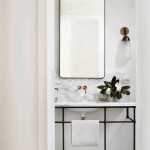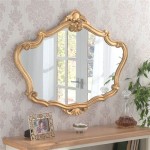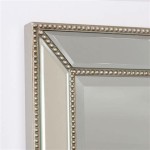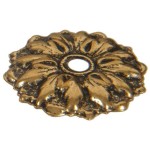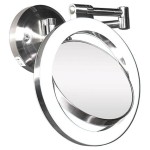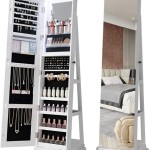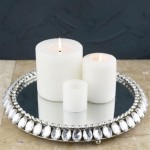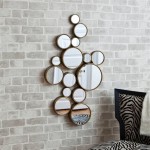How to Add LED Lights to a Bathroom Mirror
Adding LED lights to a bathroom mirror elevates both its functionality and aesthetic appeal. Proper lighting is crucial for tasks like applying makeup or shaving, and LED lights offer energy efficiency and a sleek, modern look. This article provides a comprehensive guide to installing LED lights on a bathroom mirror, covering various methods and essential considerations.
1. Choosing the Right LED Lights
Selecting appropriate LED lights is the first crucial step. Several factors influence this decision, including the desired lighting effect, mirror size, and bathroom style. LED strip lights offer flexibility and can be easily adhered to the mirror's perimeter. LED vanity lights, installed above the mirror, provide more focused illumination. Puck lights offer a discreet and customizable option, while backlit mirrors, with integrated LEDs, provide a seamless and contemporary aesthetic.
Consider the color temperature of the LEDs. Warm white (2700-3000K) creates a relaxing ambiance, while cool white (4000-5000K) provides brighter, task-oriented lighting. Daylight (5000-6500K) mimics natural light, ideal for detailed tasks. Also, ensure the LEDs are rated for bathroom use, meaning they are damp-rated or wet-rated, depending on their proximity to water sources.
2. Preparing the Mirror and Bathroom
Before starting the installation, turn off the power to the bathroom circuit at the breaker box. This is a critical safety precaution to prevent electrical shocks. Clean the mirror surface thoroughly with a glass cleaner to ensure proper adhesion of LED strips or other fixtures. Gather all necessary tools, including a measuring tape, screwdriver, wire strippers, wire connectors, and a level. If the chosen lighting requires hardwiring, consult local electrical codes and consider professional installation.
3. Installing LED Strip Lights
LED strip lights are a popular choice due to their versatility. Measure the perimeter of the mirror accurately to determine the required length of the LED strip. Cut the strip at designated cutting points, usually marked on the strip itself. Peel off the backing tape and adhere the strip to the back or edges of the mirror, ensuring even placement. Connect the strip to a power supply, following the manufacturer's instructions, and conceal the wires using clips or channels. If the strip requires a driver, ensure it is placed in a safe, accessible location within the bathroom.
4. Installing LED Vanity Lights
LED vanity lights provide direct illumination above the mirror. Choose a fixture that complements the bathroom's decor and provides adequate light spread. Mount the fixture to the wall above the mirror, following the manufacturer's instructions. Connect the fixture's wiring to the existing bathroom wiring, ensuring proper grounding. Use wire connectors and secure them with electrical tape. Test the connection by turning the circuit breaker back on.
5. Installing LED Puck Lights
Puck lights offer a customizable and discreet lighting solution. Mark the desired locations for the puck lights on the mirror's surface or surrounding wall. If the puck lights are hardwired, run the necessary wiring to each location, concealing it within the wall if possible. Connect the puck lights to the wiring and secure them in place. For battery-operated puck lights, simply install the batteries and adhere them to the desired location.
6. Working with Backlit Mirrors
Backlit mirrors offer a sleek and modern aesthetic. If replacing an existing mirror, carefully remove the old mirror, disconnecting any existing wiring. Install the backlit mirror according to the manufacturer’s instructions, taking care to connect the wiring correctly and ensuring proper grounding. The wiring for backlit mirrors often involves connecting to the existing bathroom lighting circuit. If the mirror includes features like defoggers or dimming capabilities, follow the specific wiring instructions provided with the mirror.
7. Safety Considerations
Throughout the installation process, prioritize safety. Always disconnect the power before working with any electrical components. Use appropriate safety equipment, such as insulated gloves. If unsure about any aspect of the installation, especially concerning electrical wiring, consult a qualified electrician. Adhere to all local building codes and regulations regarding electrical work in bathrooms. Ensure all components used are rated for bathroom use to prevent potential hazards related to moisture and humidity.

How To Diy Vanity Mirror With Led Strip Lights
How To Design And Install Led Strip Lighting Behind A Mirror Step By Guide

How To Add Light Poorly Lit Bathroom Vanity Mirror Ers

How To Diy Vanity Mirror With Led Strip Lights

How To Install Led Bathroom Mirror Things Keep In Mind

Diy Led Light Strips For Mirror Practical Advice Nakashi Lighting

How To Diy Vanity Mirror With Led Strip Lights

How To Make A Vanity Or Bathroom Mirror With Strip Lights

Homlux 36 In W X H Round Frameless Led Light With 3 Color And Anti Fog Wall Mounted Bathroom Vanity Mirror 27d7004792 The Home Depot

Battery Led Mirror Vs Regular Which One Should You Choose

